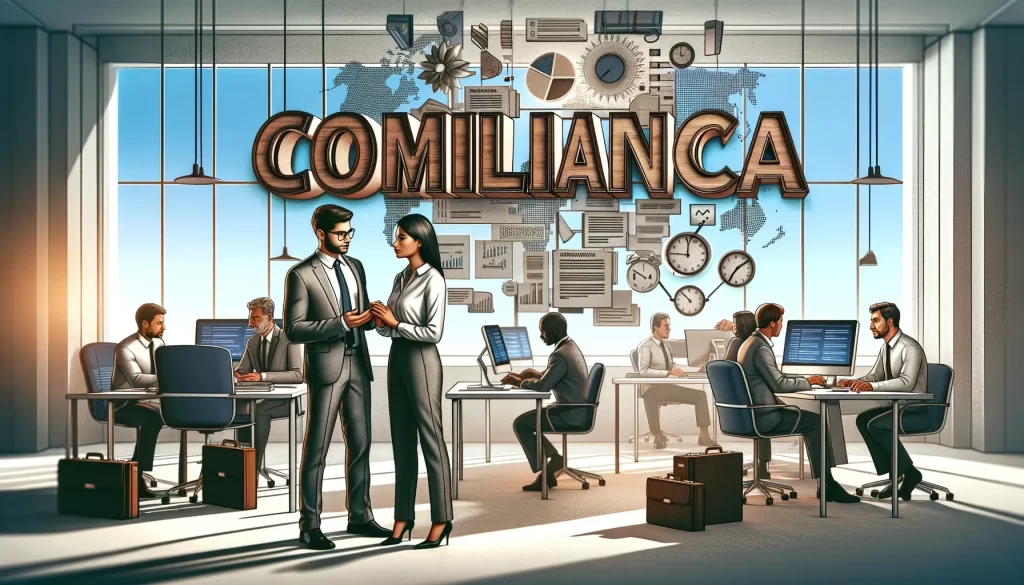Table of Contents
In the intricate realm of business, the comprehension of compliância is paramount. Compliância encapsulates the policies, procedures, and controls meticulously instituted by organizations to ensure adherence to laws, regulations, and ethical benchmarks. For any company, embracing compliância is not merely advisable but imperative to sidestep legal entanglements, financial repercussions, and reputational tarnish. This comprehensive guide unveils crucial insights into compliância, encompassing the nuances of compliância programs, strategies for crafting and implementing effective programs, and adept practices for vigilant monitoring and auditing within your organizational framework.
What Is Compliância?
At its core, compliância signifies conformity and adherence to rules, policies, standards, or laws—a pledge to uphold a set of guidelines. For organizations, this entails the establishment and adherence to procedures and controls ensuring the integrity of business operations, aligning with industry regulations and legislation. Key facets include:

Governance
- Organizational structure and reporting lines
- Decision rights and accountabilities
- Policies and procedures guiding behavior and business activities
Risk Management
- Processes for identifying, assessing, and mitigating risks
- Managing risks within the organization’s risk appetite
Regulatory Compliance
- Adhering to industry laws, regulations, and standards
- Ensuring activities align with regulatory requirements
Ethics and Integrity
- Fostering a culture of integrity and ethical behavior
- Preventing and detecting inappropriate conduct and illegal activities
Information Management
- Policies and processes for managing data and information
- Protecting sensitive and confidential information
For individuals, compliância entails understanding and adhering to the rules governing behavior, including an organization’s code of conduct, compliance policies, and relevant laws. Non-compliance can lead to disciplinary action and legal penalties. In essence, compliância forms the bedrock for well-governed organizations and ethical conduct, enabling operational excellence, risk mitigation, and the trust of stakeholders. Related Association of Business Executives.
Why Is Compliância Important for Businesses?
Compliance, synonymous with conforming to laws, regulations, standards, and ethical practices, is a linchpin for businesses. Several compelling reasons underscore its significance:
Avoiding Legal Penalties and Lawsuits
Non-compliance can incur hefty fines, legal sanctions, and even criminal charges. Lawsuits can wreak havoc on finances and reputation.
Protecting Customers and Employees
Adhering to safety, health, and ethical standards safeguards customers and employees, averting potential harm to lives and livelihoods.
Maintaining Reputation and Trustworthiness
Compliant companies are perceived as responsible and trustworthy, while non-compliance can severely damage reputation, brand image, and customer relationships.
Improving Processes and Efficiency
The pursuit of compliance unveils opportunities to streamline and enhance business processes, fostering a culture where employees comprehend the importance of rules and procedures.
In summary, compliance, far from a burdensome obligation, emerges as an enabler for responsible and sustainable business practices. It demands the ongoing commitment of companies and executives for its manifold benefits in risk mitigation, stakeholder protection, reputation building, and operational enhancement.

How to Achieve Compliância: Tips and Best Practices
Embarking on the journey to compliância necessitates strategic steps and best practices:
Focus on Transparency and Accountability
- Maintain open processes and decision-making
- Keep proper records and documentation for compliance demonstration
- Conduct regular audits and reviews of compliance controls
Prioritize Compliance Education and Training
- Educate all staff on compliance standards, policies, and procedures
- Provide tailored compliance training for higher-risk roles
- Stay abreast of the latest regulations and best practices
Implement Strong Compliance Controls
- Establish clear policies, procedures, and controls
- Monitor compliance metrics and key risk indicators
- Conduct periodic compliance risk assessments
Promote a Culture of Ethics and Integrity
- Foster an organizational culture valuing compliance
- Set a proper tone at the top
- Offer incentives for compliant and ethical behavior
Address Compliance Issues Immediately
- Detect, investigate, and remediate compliance violations promptly
- Take corrective actions to minimize risks
- Self-report material compliance failures to relevant authorities
Staying abreast of the regulatory landscape and maintaining a robust compliance program are pivotal to achieving compliância. With diligence and commitment, organizations can fulfill their compliance obligations and cultivate a reputation for integrity. Continuous improvement, coupled with an open and accountable environment, becomes the cornerstone of a resilient compliância framework.
Key Aspects and Principles of Compliância
To delve deeper into Compliância, understanding its key aspects and principles is paramount.
Key Principles
Integrity
Acting with honesty, fairness, and transparency in business dealings, avoiding deceptive practices, disclosing risks, and truthfulness in communications and marketing.
Accountability
Taking responsibility for actions and decisions, willing to be held accountable for consequences, including warranties, guarantees, and returns policies.
Compliance
Following all relevant laws, regulations, and ethical standards, encompassing environmental laws, labor laws, safety standards, and industry regulations.
Key Practices
Regular Audits and Risk Assessments
Identifying areas of non-compliance through ongoing audits and risk assessments.
Strong Policies, Controls, and Procedures
Guiding employee behavior through well-defined policies, controls, and procedures.
Ongoing Training and Education
Embedding a culture of integrity and compliance through continuous training and education.
Monitoring and Reviewing Operations
Swiftly detecting and remedying issues through continual monitoring and reviewing of operations.
Corrective Actions
Addressing non-compliance promptly, fairly, and transparently, taking appropriate corrective actions.
When these principles and practices are seamlessly integrated, Compliância emerges as a robust framework, building trust in businesses and ensuring long-term success.
Implementing an Effective Compliância Program
Effectively implementing a Compliância program entails a strategic approach:
Conduct a Risk Assessment
Identify compliance vulnerabilities through a comprehensive risk assessment, prioritizing areas such as bribery, corruption, privacy, safety, and employment law.
Develop Clear Policies and Procedures
Address major risks through easily understandable policies and procedures, communicated through training and easily accessible references.
Provide Regular Compliance Training
Ensure a comprehensive understanding of obligations and consequences through regular training, and accommodating changes.
Monitor and Audit Compliance
Verify policy adherence through regular monitoring and audits, taking corrective actions when necessary. Independent third-party audits provide an objective assessment.
Reporting Mechanisms
Establish confidential reporting mechanisms for employees to report violations, investigate promptly, and take appropriate action. Prohibit retaliation against whistleblowers.
Enforcement and Disciplinary Measures
Consistently enforce policies, fitting penalties to the severity of violations, emphasizing that compliance is an expectation, not an option.
Periodic Review and Revision
Periodically review and revise the program for improved effectiveness. Gather employee feedback and simplify processes, updating in line with changes in laws, regulations, risks, and industry practices.
A meticulously designed Compliância program, embraced across the organization, is the linchpin for averting legal issues, fines, and reputational damage. Proactive efforts in building a comprehensive program, coupled with vigilant monitoring and enforcement, position compliance at the forefront.
Final Words
This guide unravels the complexities of Compliância, stressing its vital role for businesses. Understanding and complying with regulations is crucial to sidestep legal issues, align with standards, and build an ethical organizational culture. Incremental, team-based approaches make the process manageable. Beyond business, Compliância extends to personal success, emphasizing responsibility, ethics, and integrity as essential pillars. Making Compliância a habit through diligence opens doors to opportunities and ensures a meaningful societal contribution, providing peace of mind and fulfillment in both professional and personal spheres.



